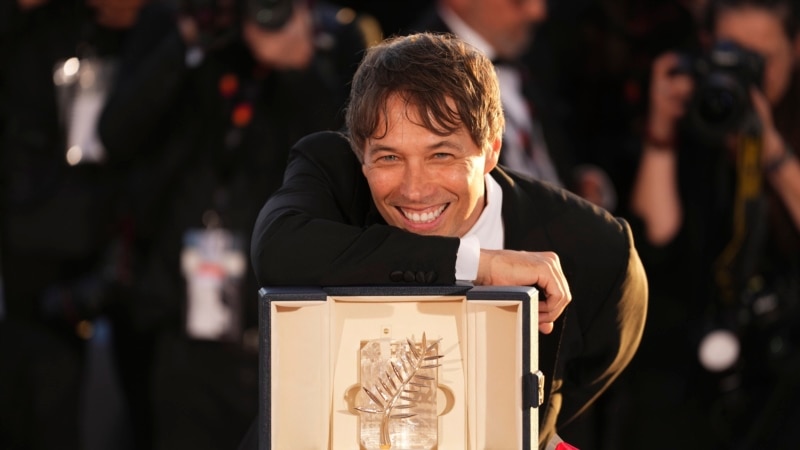This website uses cookies so that we can provide you with the best user experience possible. Cookie information is stored in your browser and performs functions such as recognising you when you return to our website and helping our team to understand which sections of the website you find most interesting and useful.

Sean Baker's "Anora," a comic but devastating Brooklyn odyssey about a sex worker who marries the son of a wealthy Russian oligarch, has won the Cannes Film Festival's top award, the Palme d'Or.
The win Saturday for "Anora" marked a coronation for Baker, the acclaimed indie filmmaker of "The Florida Project." It's also, remarkably, the fifth straight Palme d'Or won by specialty film distributor Neon, following "Parasite," "Titane," "Triangle of Sadness" and last year's winner, "Anatomy of a Fall."
"This, literally, has been my singular goal as a filmmaker for the past 30 years," said Baker, laughing.
Baker, the first American filmmaker to win the Palme since Terrence Mallick in 2012 with "The Tree of Life," said his ambition would remain to "fight to keep cinema alive." The 53-year-old director said the world needed reminding that "watching a film at home while scrolling through your phone, answering emails and half paying attention is just not the way, although some tech companies would like us to think so."
"So I say the future of cinema is where it started: in a movie theater," he said.
The awards were chosen by the nine-member jury led by Greta Gerwig, who told reporters she was "forever changed as a filmmaker because of this experience." Gerwig praised "Anora" as having the feeling of classical cinema, saying it felt like an Ernst Lubitsch or Howard Hawks film that led in unexpected directions.
While "Anora" was arguably the most acclaimed film of the festival, its win was a slight surprise. Many expected either the gentle Indian drama "All We Imagine As Light" or the Iranian film "The Seed of the Sacred Fig" to win. Both of those films also took home prizes.
It wasn't the only jolt of the closing ceremony, though.
Before George Lucas was given an honorary Palme d'Or, his old friend and sometimes collaborator Francis Ford Coppola appeared to present it to him, reuniting two of the most pivotal figures of the last half-century of American moviemaking. Coppola, who earlier in the festival premiered his self-financed sci-fi epic "Megalopolis," called him his "kid brother." Lucas called Coppola "a big friend and a brother and a mentor."
"All We Imagine As Light," about sisterhood in modern Mumbai, won the Grand Prix, Cannes' second-highest honor. Payal Kapadia's second feature was the first Indian in competition in Cannes in 30 years.
The jury awarded a special prize to Mohammad Rasoulof's "The Seed of the Sacred Fig," a drama made secretly in Iran.
Days ahead of the film's premiere, Rasoulof, facing an eight-year prison sentence, fled Iran on foot. His film, which includes real footage from the 2022-2023 demonstrations in Iran, channels Iranian oppression into a family drama.
The Cannes crowd met an emotional Rasoulof with a lengthy standing ovation.
Coralie Fargeat's body horror film "The Substance," starring Demi Moore as a Hollywood actress who goes to gory extremes to remain youthful, won for best screenplay.
"I really believe that movies can change the world, so I hope this movie will be a little stone to build new foundations," Fargeat said. "I really think we need a revolution, and I don't think it has really started yet."
Some thought Moore, who attended the awards ceremony, might take best actress. But that honor instead went to an ensemble of actors: Karla Sofía Gascón, Zoe Saldaña, Selena Gomez and Adriana Paz for Jacques Audiard's "Emilia Perez," a Spanish-language musical about a Mexican drug lord who transitions to a woman. Gascón, who accepted the award, is the first trans actor to win a major prize at Cannes.
"This award is not just for me," Gascón told reporters. "It's for all people who are fighting for themselves and their rights."
Explaining the jury's unusual choice of giving best actress to an ensemble, Gerwig said each performer was a standout, "but together they're transcendent." "Emilia Perez" also won Cannes' jury prize, giving it a rare two awards at a festival where prizes are usually spread around.
Best actor went to Jesse Plemons for Yorgos Lanthimos' "Kinds of Kindness." In the film, three stories are told with largely the same company of actors. Plemons, a standout in several chapters, didn't attend the closing ceremony.
Portuguese director Miguel Gomes won best director for his "Grand Tour," an Asian odyssey in which a man flees his fiancée from Rangoon in 1917.
The Camera d'Or, the prize for best first feature across all of Cannes official selections, went to Halfdan Ullmann Tøndel for "Armand," starring "The Worst Person in the World" star Renate Reinsve. Tøndel is the grandson of Swedish filmmaker Ingmar Bergman and Norwegian actor Liv Ullman.



 Africana55 Radio
Africana55 Radio 




